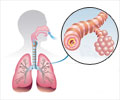Increased exposure to air pollution might put infants at an increased risk of developing bronchiolitis, reveals a new study.
Increased exposure to air pollution might put infants at an increased risk of developing bronchiolitis, reveals a new study.
The researchers found that traffic-derived air pollutants as well as wood smoke and industrial emissions were associated with infant bronchiolitis."There has been very little study of the consequences of early life exposure to air pollution," said Dr Catherine Karr, assistant professor of pediatrics at the University of Washington and the paper's lead author.
"This study is unique in that we were able to look at multiple sources including wood smoke in a region with relatively low concentrations of ambient air pollution overall," she added.
During the study, the researchers analyzed nearly 12,000 diagnoses of infant bronchiolitis between 1999 and 2002 in southwestern British Columbia, with respect to the individual's ambient pollution exposure based on monitored levels of nitric oxide (NO), nitrogen dioxide (NO2), carbon monoxide (CO), sulfur dioxide (SO2), and particulate matter from monitoring stations within 10 km of the infants' homes.
It showed that infants who lived within 50 meters of a highway had an increased risk of six percent; those who lived in a higher wood smoke exposure area had an increase of eight percent in their risk of bronchiolitis.
"In general, we found that traffic-derived air pollutants were associated with infant bronchiolitis as well as wood smoke and industrial emissions," said Dr. Karr.
Advertisement
"We were specifically interested in bronchiolitis, the main reason for children to be hospitalized in their first year, as it is an important and costly childhood illness. Reducing exposure to air pollution may be one approach to decrease bronchiolitis occurrence," Brauer added.
Advertisement
Source-ANI
SRM











